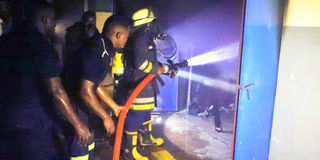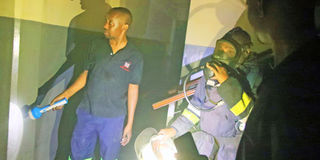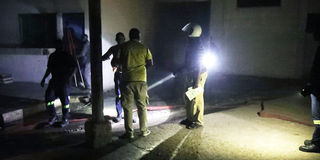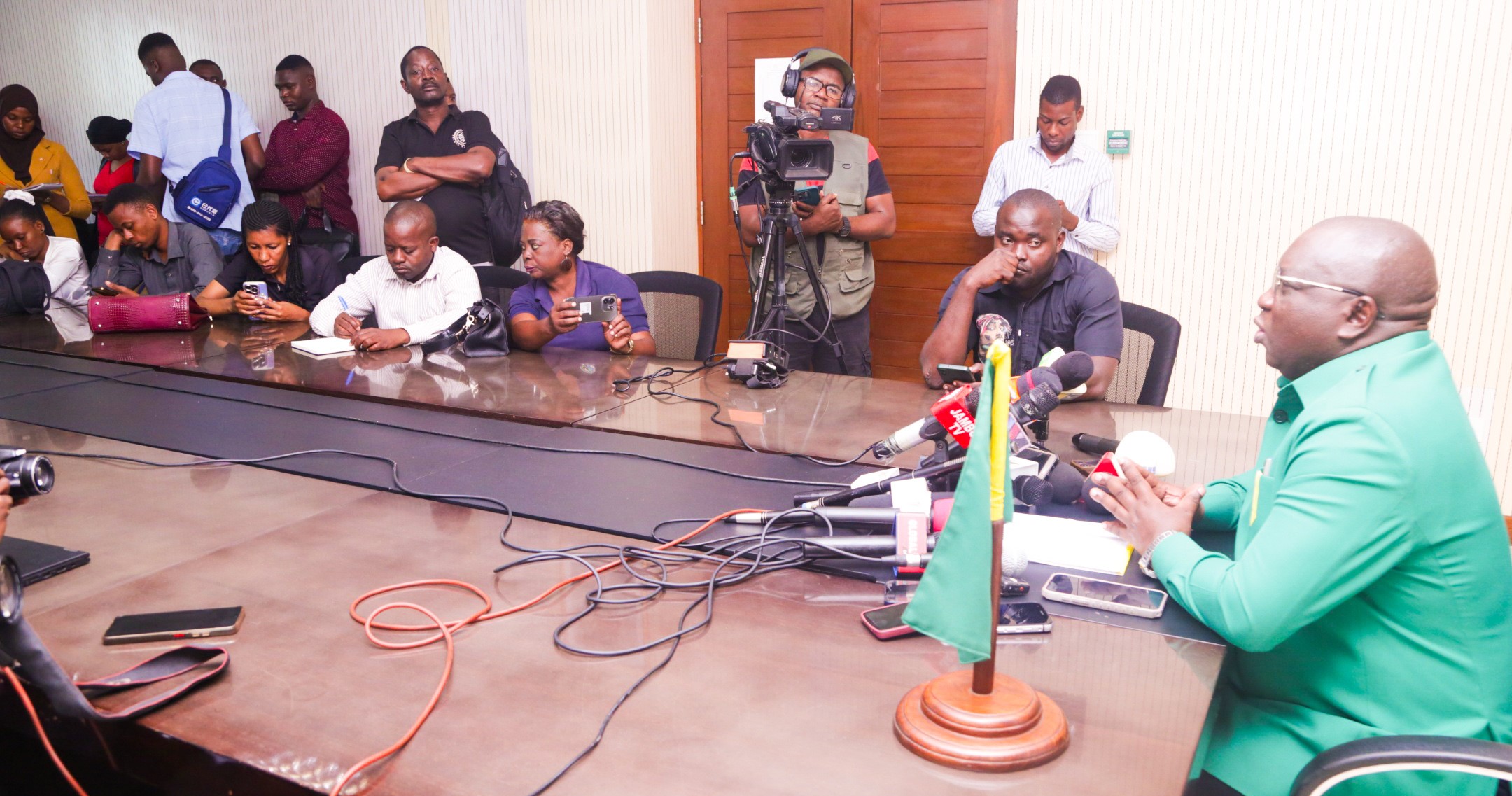MCL fire: Key lessons on disaster preparedness and teamwork

Employees of Mwananchi Communications Ltd. join forces with firefighters in an effort to contain the fire. PHOTO I MICHAEL MATEMANGA
What you need to know:
- Mwananchi Communications Ltd employees recount the story of the August 29 fire incident, the lessons that they have learnt and the way forward
Dar es Salaam. Who says boys don’t cry?
Forklift operator Mr Thadeus Kisaka, who has worked for Mwananchi Communications Limited (MCL) for 17 years, has lived the famous phrase over the years but on August 29 this year, he was overcome with emotion when he noticed a large plume of smoke rising from the company’s entrance.
On that fateful evening, at around 7 p.m, a fire broke out at one of MCL’s stores in the production department. It was a bad evening for Mr Kisaka, who works in the finance department, as he imagined how the items that he stores were burning down one by one. He wasn’t in the office when the fire broke out.
“I did not believe the information I got over the phone. I hired a motorcycle and asked the rider to speed up. On entering the gate, I was greeted by smoke that had spread all over the place,” shares Mr Kisaka.
He says he felt helpless as he believed the entire factory had been ravaged by fire. He kept walking and realised that the fire engine had run out of water.
He cried uncontrollably for ten minutes as he contemplated the future. He wondered what was going to happen now that the place he and fellow employees depended on to feed their families was being destroyed by fire. This gave him the strength to join colleagues and the firefighters who were busy trying to stop the fire from causing further damage.
Like Mr Kisaka, MCL executive director, Mr Bakari Machumu was not in the office when the fire broke out. He received a call that sent his heart racing faster than a sprinter at the Olympics.
"I just hoped and prayed that it would be a minor hiccup, like a paper jam in the photocopier. But alas, the universe had other plans," Mr Machumu recalls.
Mr Machumu called the human resources manager and directed him to perform a wellness check on the staff. He needed to know if everyone was safe and sound. Relieved to hear that all employees were safe, he called the executive editor, Mr Victor Mushi.
They had to plan how to get the newspapers printed elsewhere and luckily, the company had a secret weapon: a joint venture with The Guardian Limited and Jamana Printers, which served as a Plan B in such eventualities. These partners were there to ensure that the show went on, even in the face of adversity.
The executive director finally arrived at the scene, expecting to see a minor campfire situation. Instead, he was greeted by a plume of smoke that could make a dragon blush.
"I started to see smoke from about 200 metres away, which made me believe that the situation was bad, contrary to what I wished.”
As Mr Machumu surveyed the smoky compound, he learnt that the fire was threatening to cross over to the printing plant, which could have been disastrous.

Some of the employees had to run to safety outside the company premises. PHOTO I MICHAEL MATEMANGA
The only thing that stood between the burning store and the plant was a concrete wall whose, construction Mr Machumu praised. It would have been a different story were it not for this wall.
The MCL leader showered praise on the Regional Police Commander of Kinondoni, who showed up that night. He promised to "closely monitor" the situation. Mr Machumu hails the police, the fire brigade, SGA security, and the security company at MCL for their involvement in the event."
With the fire contained and disaster averted, Mr Machumu shifted his focus to an important task, a thorough assessment.
He wanted to know what caused the fire, which destroyed over Sh940 million worth of inventory, including printing, industrial, and automotive spare parts and components. The investigation is still going on. Further assessment is ongoing to establish losses caused by physical damage to printing presses and buildings and to quantify the cost of disruption to the business.
MCL’s human resources manager, Mr Paul Hamidu, learnt about the fire incident from one of the employees in the advertising department. As a responsible person for the company’s security matters, Mr Hamidu was consulted to advise on measures to be taken before he got to the scene.
"The first step was to make sure all staff were evacuated from their respective offices and lock the offices to prevent access from anyone with malicious intentions from outside the office," he says.
Commenting on how companies should handle such situations as they wait for help to arrive, Mr Hamidu said they should ensure they have a water system in place to help in such incidents. MCL has a system that can only be used in minor fire accidents.
We, as a company, have learnt from the incident that there are more safety requirements that we need to consider. We need to have a well in place to reserve water specifically for fire accidents, we need to have fire suppression systems, advanced fire detectors, and fire extinguisher balls. We have some firefighting equipment at MCL, which helped a great deal, but we learnt that there are more advanced ones on the market.
The company plans to train its employees to equip them with the skills on how to best communicate and offer information to the right people during accidents. The company also plans to have the health of 20 employees from the production department checked to ensure they are okay. These will also receive counselling for the emotional trauma they might have experienced during the incident.
Mr Victor Mushi, the executive editor, says he noticed a lot of activity in the newsroom and initially assumed it was just the usual buzz that surrounds matches. He later realised that people were trying to get out of the office, but he still believed everything was okay.
"Even after being told by a colleague, Jackson, it took me some time to understand there had been a fire mishap. He insisted that I move my car out of the gate. I don’t remember how I got to the parking lot. But then I had to come back and make sure nobody was left behind," he says.

Firefighting exercise goes on in one of the affected buildings. PHOTO I MICHAEL MATEMANGA
When Mr Mushi went out, he realised there was smoke everywhere, and his eyes couldn’t bear it. He drove his car out and parked it in a safe place. When he came back, he realised things were not optimistic, and his biggest worry was whether nobody had been left in the newsroom.
"Among the lessons learnt is that MCL needs to have a more structured way to deal with these emergencies so that we all know what comes first and what comes next," says Mr Mushi.
Mr Aliamin Adam, the image supervisor in the production department, is the one who first noticed the smoke and informed his colleagues. He had heard fire alarms but ignored them because they frequently went off even when there wasn’t a fire.
He had been choking before the alarms went off but he wasn’t sure why. Mr Adam then noticed heavy smoke rising from the window as the sound of the alarms grew louder.
"I was very shocked. If I had been in the area where the fire had started and the room wasn’t strong, I would have died, and no one would have noticed. I left the office immediately and went down to inform the rest," says Mr Adam.
Most of the senior editors at MCL, like Mr Joseph Damas, the managing editor of Mwananchi, Mr Mpoki Thomson, the managing editor of The Citizen, and Mr Kulwa Magwa, the chief sub-editor of Mwanaspoti, had their own dramatic tales to tell.
Mr Thomson said he was happy that despite the incident, the employees were able to work as one and managed to meet the deadlines for the following day’s newspapers.
Mr Damas says he and his colleagues were in the final stages of production and that he had no idea he was about to witness a live-action thriller.

Employees played a major role in controlling the fire. PHOTO | MICHAEL MATEMANGA
In the end, amidst the chaos and drama, the employees of Mwananchi Communications Ltd. managed to stay safe, and their resilience shone brightly.
It was a day they would never forget—a day when they learnt that even in the face of adversity, a little humour and a lot of teamwork go a long way.
As they say in showbiz, "The show must go on. And for this renowned media company, the show did go on, thanks to a joint venture and some quick thinking.
On that day, some regions missed the papers, while others got them. The regions that got the papers are Morogoro, Iringa, and Dodoma, while Arusha, Mbeya, and Mwanza did not. Despite the challenge, customers were able to read stories through the company’s EGazeti app.





